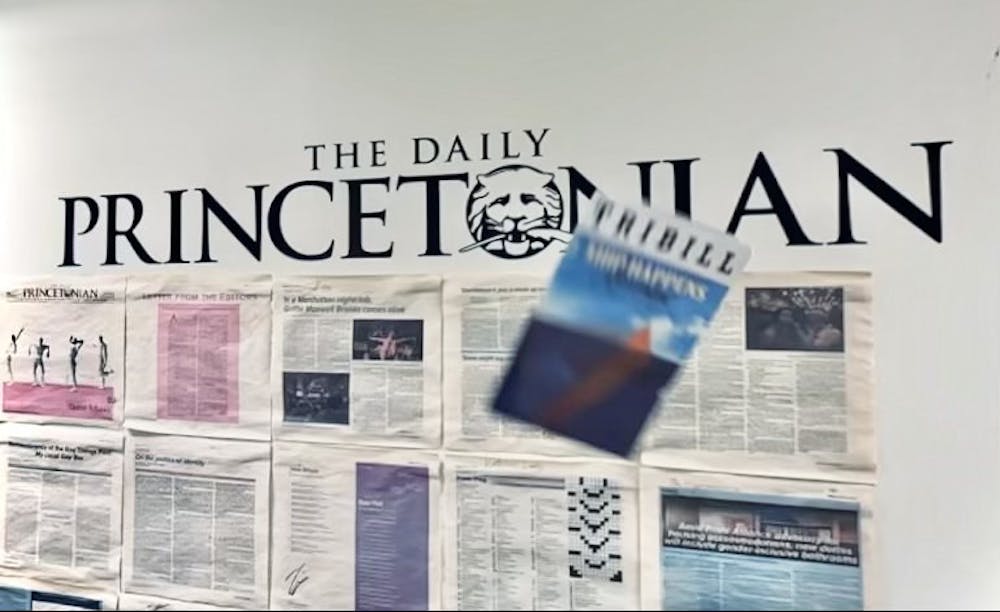Editor's note: Inspired by a note from a predecessor in this role, I decided to revive the antiquated tradition of the Editor-in-Chief writing a review of the Triangle show. This review is not entirely satirical and sadly not at all fictional, though it does discuss fiction. But nonetheless, it is definitely not serious.
Triangle’s 2023 Fall Show, “Ship Happens,” is a show of three Princeton pre-reads. It has to do with the Class of 2026 pre-read “Every Day The River Flows” because it takes place on a boat that could very easily be going down the Magdalena. It has to do with the Class of 2027 pre-read “How to Stand Up to a Dictator,” because like Maria Ressa ’86 would want, the show is about how the Internet is the source of all evil in the world (though it’s complicated, we’ll get back to that later). But mostly, it’s about the Class of 2025 pre-read, “Moving Up Without Losing Your Way.”
Throughout the show, we’re told that moving up is losing your way, that there’s nothing but pain at the top of the mountain. Yet our flawed protagonist, like every Princeton student before and after her, cannot help it — up is the only way that she knows. In a burst of childhood nostalgia, the writers half-heartedly assert that love can solve these problems, absolving us from the sins that we commit ourselves. But they don’t believe it. We don’t believe it either.
Isla (played by a somber Triangle President Gabriela Veciana ’24) starts the show with the realization that the Internet is a very scary place. She has gone “bad viral!” Everyone sits up in their seats. This show is bringing up . . . the perils of virality?! That’s like writing a play about the Black Death in the 14th century. No one told us that this was a horror musical.
“I used to be a normal girl, but now I’m just a meme,” Isla sings, as onlookers watch and take pictures. Ah, the flash of the phone camera. Its creators had such bold ambitions of transparency and democratization. And now it’s the universal symbol of hatefulness, superficiality, and mob punishment.
“I’m sick of the trolling and endless doom scrolling,” Isla continues. “Take that big tech,” she shouts as she throws her phone off the boat. Oh, if only it were that easy, Isla.
And yet, the boat’s costumed characters (this is a spoof of a Disney cruise), which we can think of as the traditional media alternatives to Isla’s taste of internet fame, are not in tip-top condition either. Sure, they’re surrounded by adoring crowds, but they’re not paid enough and the children are annoying. They don’t need the adoring crowds. They’d settle for a good union.
And so we arrive at our cautionary character, Isla’s twin sister Lindsey, played by a scene-stealing Charlotte Kunesh ’24. Has she listened to the like 20 songs about how tough it is to be famous? Clearly not. With the Disney characters literally shouting at her that they’re pawns of the traditional Triangle evil billionaire Roberta Hatt (Madeleine LeBeau ’24 at her most brilliantly evil), Lindsey makes a deal with Hatt to make herself big — make herself a celebrity. And, of course, terrible things follow.
In that character, we see the Princeton student. The student is faced with the depressing realization that the entire world is corrupt, every institution and every sphere of society is completely pointless and unworthy of their many talents. And nonetheless, they can’t help it. Princeton students, by definition, seek the spotlight, the influence. They make deals with the archetypal cackling Triangle heiress. And they feel trapped: by business, by the internet, by the expectations they had in their childhoods. But at the end of the day, no one ever chooses not to climb the ladder of professional influence.
And true, the second half of the play involves a complicated hero’s quest as Isla seeks to reverse the curse that Lindsey has placed on the boat. Aided by a charming love triangle between herself, the show’s narrator, and the suave “Prince Sincere” (Jay White ’24 and Radon Belarmino ’26 make a compelling show couple), Isla eventually breaks the curse in classic Disney fashion, through the power of sisterly love.
It’s a satisfying conclusion, but not one the show really commits to. “Think about it, but not too hard,” the narrator asks the audience at one point (this part particularly resonated with me, and I have followed this maxim to a tee). But even within the show, the characters point out the implausibility of the tidy ending.
Lindsey’s problem may be solved, and Isla may even learn to embrace her role in the digital age and stop trying to wish away her virality. But by the end of the play, the actors take their bows and the characters disappear back into the minds of their creators and the memories of the audience. The audience has to return to the terrifying paradox of a path forward beset by toxic internet virality, corporate menace, and commodified nostalgia that they will all ultimately choose.

As the rest of the characters return to the dock, the audience may feel more like the play’s Leonardo DiCaprio as he floats on the door after evicting Rose. Leo, like the audience, has to sit with his problems, with some diversions, but no resolution in sight.
Rohit Narayanan’s theatrical career started with a starring role as Lewis Carroll in his fifth grade play, “Alice in Wonderland.” He has had a long career in middle school and later-middle school theater and has been favorably mentioned in multiple minor trade magazines. He can be reached at eic[at]dailyprincetonian.com.








